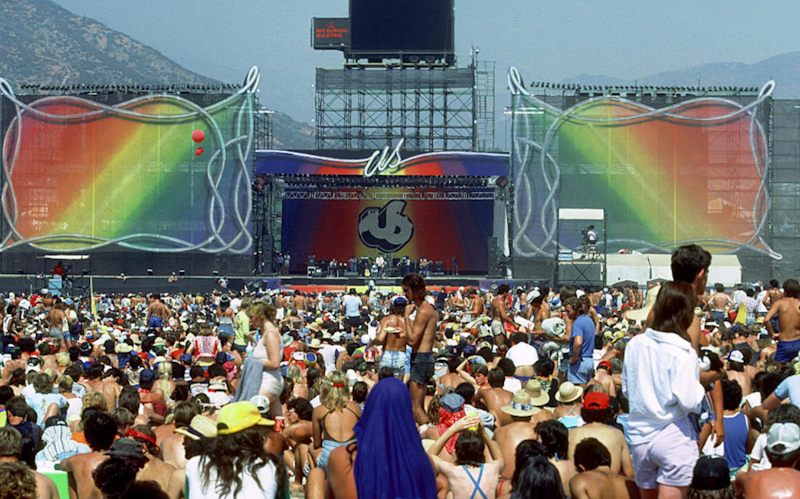I recently won two tickets to Coachella 2023 for donating to KCRW radio in Los Angeles. I asked if I could take the financial equivalent instead. The guy on the phone was confused.
“You don’t want to go to Coachella?”
“I’d rather stick a needle up my ass,” I told him.
Maybe I’m just an old man, but music festivals aren’t what they once were.
I checked out the Coachella lineup. Bad Bunny, Jackson Wang, Metro Boomin, Deadmau5, Rae Sremmurd. They sound like pharmaceutical names advertised on late-night TV. The above acts have one thing in common. None of them play instruments. The synth-pop dance music is all sampled, programmed dreck. It’s like watching bad karaoke or listening to a Best of Abu Ghraib CD.
The only intriguing names on the lineup were Björk, Chemical Brothers and The Breeders. But these performers are so far past their prime they sound like tribute bands. I like the music of Gabriels and SOFI TUKKER but there’s no way I’m traveling to a desert pit with a throng of pulsing, screaming ravers to hear two decent bands amid the musical murrain.
Coachella is branded as a free-spirited, fun-loving gathering of fans and bands united by a mutual love of music. This is a cynical guise hiding millions of dollars in corporate advertising. Festival sponsors include American Express, Samsung, Absolut Vodka, Spotify and SiriusXM. The event exposes young concertgoers to NFT brands, Crypto exchanges and music streaming services that capitalize on bad music. As The New Yorker’s Carrie Battan wrote in 2016, Coachella is “a moneyed and hollow representation of counterculture.”
There was a time when music festivals introduced vibrant new music. The Newport Folk Festival in 1965 allowed Bob Dylan to shed his acoustic skin and “go electric.” The 1967 Monterey Pop Festival featured a career-altering performance from Jimi Hendrix. Woodstock was a defining counterculture event attracting performers like Creedence Clearwater Revival, Janis Joplin, and Jefferson Airplane.
Four months after Woodstock came Altamont, a free music festival in Tracy, California. 300,000 people attended to hear the Rolling Stones, Santana, The Flying Burrito Brothers and Crosby, Stills, Nash and Young. The event was a disaster marred by violence, LSD overdoses, two hit-and-run car accidents and the stabbing death of a man by a Hell’s Angels gang member. Altamont put a damper on major American music festivals for 20 years.
Festivals returned in 1982 with the Steve Wozniak-sponsored Us Festival. The lineup featured prominent 1980s bands like The Police, Oingo Boingo, Ramones and Talking Heads. Wozniak lost money on the event but sponsored a second Us Festival a year later. By the mid-80s, massive charity-based events like Live Aid and Farm Aid dominated the festival landscape. Lollapalooza debuted in 1991 while Coachella first appeared in 1999.
I don’t like crowds so going to a festival would require something special. This happened in 1993 with the WOMAD Festival (World of Music, Arts and Dance) at Cal State Dominguez Hills. The lineup featured my two favorite performers at the time, Peter Gabriel and Sinead O’Connor. Crowded House, Ziggy Marley and artists from Gabriel’s Real World Record Label like Sheila Chandra and Geoffrey Oryema rounded out the lineup.
My favorite WOMAD performances were wholly unexpected. The first was the Tanzanian singer Remy Ongala who played Congolese Soukous music with intricate percussion, fast-paced guitar and soulful Swahili intonations. Ongala’s unique voice was so beautiful and haunting it was included in the soundtrack to Oliver Stone’s movie Natural Born Killers.
The second highlight came from the Drummers of Burundi. A dozen master drummers from the small African Republic of Burundi stood in a semi-circle, each with their own hollowed-out log drum covered with animal skin. The drummers leaped, danced and played frenetic percussion in unison. The rhythms were thunderous and majestic.
Despite the wonderful music and positive crowd energy, I quickly grasped the downside. 100,000 people attended WOMAD. Parking was a nightmare. Food and drinks were overpriced. The porta potties were disgusting and once the sun went down, festivalgoers peed in the grass rather than lose their spot to make a bathroom run. By the end of the night, the whole place smelled like urine.
Coachella 2023 attracted 250,000 people. With general admission tickets starting at $550, this amounts to a gross of nearly $140 million. This explains how Beyoncé was paid $10 million to appear at Coachella 2018. The event is big-business capitalism, not counterculture idealism.
A different kind of music festival appeared in 1987. South by Southwest (SXSW) branded itself as a conglomeration of music, film and interactive media. Bands covered their travel expenses and were paid a few hundred dollars in cash. Instead of one large venue, they played at 15 small clubs around town. Only 700 people registered to attend the first SXSW and the music lineup was lackluster. Fifteen years later, SXSW was introducing new bands like Spoon, Voxtrot, Heartless Bastards and Okkervil River. Organizers focused on music first, profit second.
The Bridge School Musical Benefit in Mountain View, California was started by Neil Young and wife Pegi in 1986 as a non-profit charity event to benefit the Bridge School for children with severe speech and physical impairments. The festival attracted performers like Radiohead, Pearl Jam, Red Hot Chili Peppers and David Bowie. It earned over a million dollars a year and kept the Bridge School alive. Locals cherished this yearly musical gathering and it lasted until Young and his wife divorced in 2016.
Music festivals should be about the music. They introduce new bands, feature emerging musical genres and raise money for worthy causes. A festival can bring a city or town together and create cultural identity. Or it can be a disaster like Coachella.

